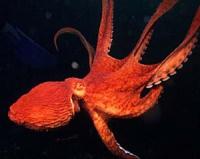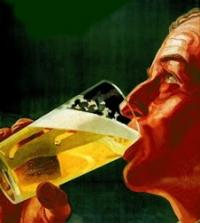
Original American Beers
#21

Posted 30 March 2011 - 05:29 PM
#22

Posted 30 March 2011 - 05:46 PM
I thought fruit was strictly prohibited be the purity law in GermanyDid fruit wheat beers originate in the states? Are they a distinct style rather than a derivative of German or Belgian wheat beers? I'm inclined to think they are.
#23

Posted 30 March 2011 - 06:08 PM
#24

Posted 30 March 2011 - 06:38 PM
Based on the responses I got, I'd say that was a derivative.Black IPA / Cascadian Dark Ale
#25

Posted 30 March 2011 - 06:40 PM
IIRC, the Germans who like fruit in their beer use some sort of fruit-flavored syrup in the glass of beer. The beer is brewed according to the Reinghsoscecehgrbvrdkdlkjdfjdhjbot and the flavoring is added later.I thought fruit was strictly prohibited be the purity law in Germany
#26

Posted 30 March 2011 - 06:52 PM
I guess that is part of my thinking when I mentioned fruit beers. There really isn't a continental or UK style quite like a fruit beer like the ones typically brewed in the USA.IIRC, the Germans who like fruit in their beer use some sort of fruit-flavored syrup in the glass of beer. The beer is brewed according to the Reinghsoscecehgrbvrdkdlkjdfjdhjbot and the flavoring is added later.
#27

Posted 30 March 2011 - 06:59 PM
#28

Posted 30 March 2011 - 07:18 PM
Probably right. Magic Hat, come on down. Hey, wait a minute... does that mean we have to include Bud Light Lime?yeah if the Swankey is in I'd put the likes of Apricot Ale in their as well
#29

Posted 30 March 2011 - 10:28 PM
Had one on cask tonight that was the best version of the style i've had at a cask festival. It was not American:Windsor & Eton Conqueror Black IPA 5.0 Brewed with a careful blend of 5 speciality malts along with Summit and Cascade hops to produce an intense combination of roasted flavours balanced with full fresh pine hop aroma. Brewed at Windsor, Berkshire England by Windsor & Eton.Black IPA / Cascadian Dark Ale
#30

Posted 31 March 2011 - 02:43 AM
I'd say the derivative was taken 2x on that one!Based on the responses I got, I'd say that was a derivative.
#31

Posted 31 March 2011 - 05:33 AM
If everything is looked at as a derivative and therefore doesn't count there are no American beers. For example, kenn. common is just a derivation on a Berliner, CAP variation on BoPils, steam beers are just poorly brewed lagers, etcI'd say the derivative was taken 2x on that one!
#32

Posted 31 March 2011 - 05:43 AM
in this case I'd say AIPA and APA are a much bigger leap from their english counterparts than cascadian IPA is from AIPA. I'm not sure if you combined both changes you get something "american" or not. I think the brewing community is much too global now for new styles to be defined by a region. even english brewers are making more american style beers now (and using american ingredients).If everything is looked at as a derivative and therefore doesn't count there are no American beers. For example, kenn. common is just a derivation on a Berliner, CAP variation on BoPils, steam beers are just poorly brewed lagers, etc
#33

Posted 31 March 2011 - 07:56 AM
BAM!See what I mean? It's very arbitrary where you draw that line. However I did think of one more that might, might qualify if you squint hard enough. Feel free to mock me for this one but I was thinking Sam Adams Boston Lager. It's not a pilsner although it's sorta hoppy like one; it's not a Vienna or Oktoberfest although it's amber; it has some caramel flavor but it's too bitter (and not strong enough) to be a bock. It's really kind of a unique beer. I think if you can put Anchor Steam in that category, you can put SABL in it too.I knew someone would reply with Chicha as soon as I posted. I was thinking more North American
#34

Posted 31 March 2011 - 09:13 AM
But that's a a pale aleish kinda thing with fruit. It that's in, then the beers I listed should be, too.yeah if the Swankey is in I'd put the likes of Apricot Ale in their as well
#35

Posted 31 March 2011 - 09:24 AM
#36

Posted 31 March 2011 - 09:27 AM
... and Lambics are just ales brewed with bad sanitation, and stouts are just pale ales where the maltster burned the malt (or forgot to let some sprout and then burned it), and doppelbocks are just strong bocks which are just overly malty Helles...They are very few firm dividing lines in the world of beer.If everything is looked at as a derivative and therefore doesn't count there are no American beers. For example, kenn. common is just a derivation on a Berliner, CAP variation on BoPils, steam beers are just poorly brewed lagers, etc
#37

Posted 03 April 2011 - 12:26 PM
I think it's technically brewed according to an exception made to the Rheinheitsgebot, which wouldn't allow the use of either Wheat Malt or Lactobacillus.Depending on the exact year it was invented, Steam Beer might even be a Mexican beer, since California was Mexico until 1848, immediately before the gold rush with which it's associated.IIRC, the Germans who like fruit in their beer use some sort of fruit-flavored syrup in the glass of beer. The beer is brewed according to the Reinghsoscecehgrbvrdkdlkjdfjdhjbot and the flavoring is added later.
#38

Posted 03 April 2011 - 12:47 PM
You're correct on the wheat, but yeast wasn't discovered until a long time after the R'gebot was written. There is no mention of yeast (or bacteria) in the R'gebot.I think it's technically brewed according to an exception made to the Rheinheitsgebot, which wouldn't allow the use of either Wheat Malt or Lactobacillus.
#39

Posted 03 April 2011 - 01:43 PM
Not in the 1487 or 1516 versions, of course, but it was later revised to include yeast after Pasteur. Beer Purity Law, as it has existed for the last 100+years, has included yeast as one of the few allowable ingredient, along with wheat malt for a few styles.You're correct on the wheat, but yeast wasn't discovered until a long time after the R'gebot was written. There is no mention of yeast (or bacteria) in the R'gebot.
0 user(s) are reading this topic
0 members, 0 guests, 0 anonymous users















